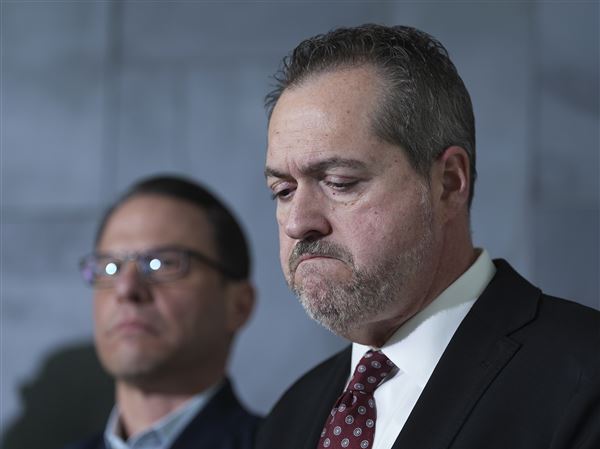WASHINGTON — Gov. Josh Shapiro will learn in the next day or two whether he will be running for vice president on a ticket led by Kamala Harris or a surrogate hoping to keep the White House in Democratic hands.
Mr. Shapiro has emerged as one of the finalists for the vice-presidential nomination. Being chief executive of the most populous battleground state is a plus. So too is his moderate positions on issues such as energy, providing an answer to those who claim Ms. Harris is too far to the left. But his ascension to the No. 2 spot may not sit well with Arab Americans and others already unhappy with President Joe Biden’s strong support of Israel over Hamas. And his positions on fracking and school vouchers are at odds with many progressives whose support is needed for the Democrats to retain the White House.
Here’s what Mr. Shapiro’s presence on the Democratic ticket would likely mean this fall.
He likely ensures that Pennsylvania remains blue
Mr. Shapiro received a 55% job approval rating in the most recent Susquehanna Polling & Research poll, more than double the 26% that disapproved of his performance as governor. That includes 63% of what the poll called swing voters.
It’s hard to envision a path to victory for the Democrats that doesn’t include Pennsylvania’s 19 electoral votes.
President Joe Biden grew up in Scranton and had close ties to the Keystone State, which was one of the reasons Barack Obama chose him as a running mate, said Jeff Brauer, political science professor at Keystone College in Scranton.
Mr. Obama needed to win Pennsylvania. So does Ms. Harris, and Mr. Shapiro’s ties are even closer.
“The bottom line is Kamala Harris needs to win Pennsylvania if she’s going to win the presidency, and she’s not going to win it on her own,” Mr. Brauer said. “Shapiro is the natural choice, and he’ll also help her in places like Michigan.”
He’s the Democratic answer to JD Vance
At their national convention in Milwaukee last month, Republicans said vice-presidential nominee JD Vance could reach out and speak to the blue-collar workers of Pennsylvania and other battleground states because he grew up among them, knew them, and could address their worries and needs.
Mr. Shapiro may not have grown up among those residents, who switched to Donald Trump in 2016 before returning to the Democrats in 2020, but he knows them and their concerns as well. He campaigned among them when he ran for governor in 2022, and has returned to solidly “red” districts repeatedly as governor. He has a reputation of being a moderate. He drew the support of 64% of independents, 16% of Republicans and 15% of Trump supporters in the 2022 race, according to exit polls.
Yes, Ms. Harris comes from California and already is being attacked as a far-out liberal from the Left Coast. But Mr. Shapiro’s record provides an instant answer to that.
Jewish voters are an important part of the Democratic coalition
Jews vote in large numbers, are a key constituency in Pennsylvania and other battleground states, and usually support Democrats, even as Republicans try every four years to woo them by touting their strong support of Israel. Ms. Harris has expressed concerns about the large number of Palestinian casualties as Israel retaliates for the Oct. 7 attack by Hamas.
Mr. Shapiro has been a staunch supporter of Israel’s right to defend itself — calling Hamas “pure evil”— though has called for a Palestinian state alongside the Jewish state in the Middle East. He called Israeli Prime Minister Benjamin Netanyahu “one of the worst leaders of all time.” And he has spoken out against the rise in antisemitism that followed the Hamas attack, criticizing then-University of Pennsylvania President Elizabeth Magill for refusing to say that protesters’ calls for the genocide of Jews violate the university’s code of conduct, and calling out an anti-Israel protest that targeted a kosher restaurant in Philadelphia.
“They protested in restaurants, simply because it’s owned by a Jewish person,” he said in response. “That is the kind of antisemitic tropes that we saw in 1930s Germany.”
Just his presence on the national ticket will serve as a reassurance to Jewish Americans scared about the rise in antisemitism.
Pennsylvania has more than 430,000 Jewish residents, behind only New York, California, Florida and New Jersey, according to the American Jewish Year Book.
Two words: Oil. Gas.
Oil and gas extraction is a major part of Western Pennsylvania’s economy, and Mr. Shapiro is a supporter of fracking and a critic of Mr. Biden’s temporary moratorium on building new export facilities for liquefied natural gas. Ms. Harris opposed fracking during her brief run for president in 2020 and cast the deciding vote to approve billions of dollars for clean energy projects. Still, the Biden administration set records for the amount of oil produced during its tenure.
Mr. Shapiro’s presence on the ticket would be a signal to Pennsylvania that the new Democratic administration won’t immediately shut down oil and gas production and cripple a key industry in the Keystone State, even as it moves towards clean energy sources like the new hydrogen hub in Western Pennsylvania, West Virginia, Ohio, and Kentucky.
He can appeal to members of the faith community
Unusual for Democrats, Mr. Shapiro is not shy about talking about faith and religion. During his gubernatorial campaign, he ran an ad about his observance of the Sabbath. He sends his children to Jewish day schools. He keeps kosher and attends synagogue.
And he has backed the use of taxpayer dollars for tuition at private schools, putting him at odds with the powerful teachers unions who endorsed him for vice president anyway.
He has worked with the other side
Yes it was late, but Mr. Shapiro recently got a state budget through a Democratic House and Republican Senate. That’s a plus for those who say they favor bipartisanship, and perhaps a selling point for Republican voters who don’t like former President Donald Trump but aren’t sold on Ms. Harris as an alternative.
State Sen. Lisa Boscola, D-Northampton, said Mr. Shapiro “does recognize the need to work both sides” and acted as “a very moderate lawmaker.”
And after the 2023-24 budget passed the Legislature, Mr. Shapiro said, ”Bipartisanship is what fires compromise.”
Pro-Palestinian protesters abandoned Biden. Will Shapiro keep them away?
Mr. Shapiro has faced some protests for his support of Israel over Hamas, but nothing like Mr. Biden and other Democrats have. But after Mr. Biden pulled out, Ms. Harris reached out to members of the Arab American community, a crucial voting bloc in swing-state Michigan.
While she is a fierce defender of Israel’s right to exist and of American support for the Jewish state, she does not have the decades-long history of support for Israel that Mr. Biden has, skipped Israeli Prime Minister Benjamin Netanyahu’s address to a joint meeting of Congress, and said that during her private meeting with Mr. Netanyahu, she expressed her “serious concern about the scale of human suffering in Gaza, including the death of far too many innocent civilians.”
Ms. Harris, like Mr. Biden, has advocated a ceasefire that also provides for the release of the hostages taken by Hamas and for an increase in humanitarian aid to the Gaza Strip. The Biden administration has opposed calls for an immediate ceasefire like the one Hamas broke last October, which would keep the hostages in the hands of the U.S.-designated terrorist group.
Mr. Shapiro could help quiet concerns among some Jews that Ms. Harris won’t be as supportive of Israel as Mr. Biden is, but also could hinder the vice president’s efforts to win back the Arab Americans who supported the Democrats four years ago.
First Published: August 4, 2024, 9:15 a.m.
Updated: August 4, 2024, 5:21 p.m.

































